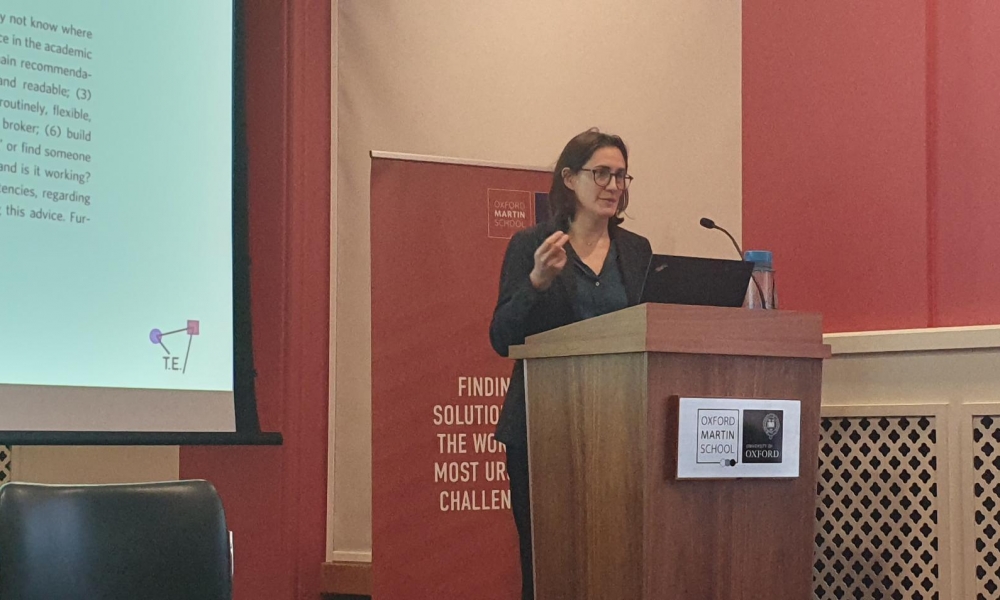Rapid, policy-focused research: can we be both ambitious and pragmatic?
recent news
- Presenting at the Agricultural Economics Society Annual Conference: John Lynch
- Researcher Spotlight – Saher Hasnain
- Putting nature on the map – identifying locations for nature recovery and nature-based solutions

On 22 November 2023 the Agile Initiative ran a day-long event to showcase its approach to conducting rapid, high-quality, policy-focused interdisciplinary research, and generate debate around addressing challenges and emerging trends in the UK and globally that will influence this form of research. Agile Sprints presented their research and results, and the keynote presentation and panel discussions explored ‘What’s been done before?’ and ‘What’s next?’
We opened the day with Professor Natalie Seddon and ProVC Professor Patrick Grant setting the scene on what the Agile Initiative is trying to achieve: highlighting to researchers, policy-makers, industry professionals and other stakeholders both the need for and how to do rapid, high-quality interdisciplinary research to inform policies seeking to mitigate environmental emergencies.
Kathryn Oliver (Professor of Evidence and Policy at the London School of Hygiene and Tropical Medicine) presented the keynote, asking the question “Can we be both ambitious and pragmatic?” She highlighted what other fields are doing in this area, and emphasised the need for interdisciplinary research to learn from what’s come before. Professor Oliver encouraged the research community to move away from thinking about personal impact and towards public services, to consider what the research has to offer in the context of system change.
We heard from the cohort of Sprint researchers at the Agile Initiative, who presented posters on their research. Our Sprint teams conduct rapid research in tight-knit interdisciplinary teams – on average within 12 months – which produce outputs for decision-makers and industry professionals to generate tangible impacts on policy and practice, alongside academic publications. You can read more on the Sprint pages.
The day also included two panels which identified and discussed issues with doing this kind of research. Key messages included:
- Navigating political dynamics: we need to be ready to change tactics depending on the political interest of the current government.
- The work that needs to happen before or after a Sprint: such research may require a much larger picture, involving more funding, activity, collaboration, and time than is possible in a Sprint.
- Large, interdisciplinary teams: these may already exist as tight units, making it easier to get on with the research, but harder for isolated academics to contribute.
- Policy-focus: finding the overlap between research and policy questions is key.
- Qualitative social science: works in a different way to the hard sciences, but is just as crucial in the science-policy process.
- Targeting: identifying areas where the research is lacking, or where there is something new to say.
- Underrepresented voices: bringing in underrepresented voices at early stages in research is key.
- Quality and trust: ensuring research is academically rigorous.
- Early Career Research: sprint research means short contracts and attention away from writing journal papers, but also builds a basis for grant applications.
- Policy literacy: recognising the mess and chaos of the policy process, that the science-policy area requires learning new skills and ways of working, and that everyone on the team is on the same page.
- Long term evaluation: ensuring we include evaluating research in the wider picture in the process.
- Importance of narrative: research outputs need to communicate clearly the direction and recommendations.
- Intentional positioning: deciding who the audience of the research is, what precise problem the research is intending to address.
Everyone involved in the Agile Initiative has the drive and ambition to find workable solutions to the environmental and climate emergencies. Every challenge we identify also offers opportunities for the research and policy communities to experiment with new and pragmatic approaches to working together. The learning that emerged from this event was hugely valuable, and we will build on it as Agile approaches its mid-point, seeks further connections with other research programmes tackling similar issues, and initiates new Sprints.
Watch panel 1 here: What’s been done before?
Watch panel 2 here: What’s next?
Thanks to our Sprint teams for presenting their posters, and to the speakers: Patrick Grant, Kathryn Oliver, Aline Soterroni, Carlo Palazzi, Anupama Sen, Peter Barbrook-Johnson, Will Pryor, John Lynch, James Robson, and Mark Hirons.
The Agile Initiative run events around how to work in the policy-science space, and there will be a targeted call for Sprint proposals coming up in early 2024. To keep up to date with our activities, join our mailing list.


